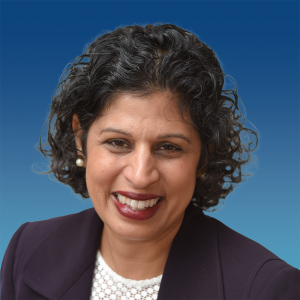 Susmita Pati, MD, MPH, a nationally recognized physician-scientist with expertise in advancing health equity and workforce development via population health analytics, innovation, and system transformation, is the newest member of Children and Screens’ National Scientific Advisory Board.
Susmita Pati, MD, MPH, a nationally recognized physician-scientist with expertise in advancing health equity and workforce development via population health analytics, innovation, and system transformation, is the newest member of Children and Screens’ National Scientific Advisory Board.
Dr. Pati is a tenured professor of pediatrics, the division chief of primary care pediatrics, and the Chief Medical Program Advisor for the Alan Alda Center for Communicating Science® at Stony Brook University.
Her decision to enter into the field of pediatrics was driven by her love of children, “playing with them, seeing the sense of wonder they have when they learn.” She notes that she was initially torn between pursuing a career in pediatrics or surgery, but “the love of children won out.”
The Importance of Teamwork and Communication
As she progressed in her career, a key lesson she learned was the importance of teamwork and communication, explaining that “what makes teams function really well is honest, transparent, empathetic communication–whether that’s in clinical care, research, education, that’s really a key driver of success.”
She drew upon the importance of teamwork and communication when spearheading the Keeping Families Healthy program–a nationally award-winning program using trained community health workers to function as a direct extension of the primary care medical home.
Driven by the goal to help families achieve self-sufficiency in following clinical care recommendations, the program integrated learners across disciplines and levels of experience (including medical students, nursing students, undergrads, residents). The program ran for 8 ½ years, served more than 1,500 families, improved vaccination rates being up to date amongst young children under 3, and reduced preventable emergency room visits by 50% among families that participated in the program. The program won the Academic Pediatric Association Health Care Delivery Award–and Dr. Pati notes that “teamwork and communication were the foundation for the program’s success.”
She also noted the importance of bringing together perspectives from varying fields of expertise–a belief that informs her advice for anyone interested in entering the field of pediatrics or adjacent fields. Dr. Pati recommends soliciting advice, sponsorship and mentorship from multiple people, explaining that “in mentorship and sponsorship I think it’s really important to think about bringing together different folks for different things.” She recommends building a team of mentors, composed of experts that can provide guidance on different areas, “and maybe even bring them together in the same room once in a while, whether it’s virtually [or otherwise], to bounce ideas off one another.”
The Negative Effects of Social Media
When asked why she decided to join Children and Screens’ National Scientific Advisory Board, she explained “we all know what’s been happening with social media and digital influences on children, and that was highlighted during the pandemic and in the wake of the pandemic.” She noted seeing the negative effects of digital media on children in the wake of the pandemic in her own practice—particularly “a loss of learning, anxiety, the stress,” and described this as a motivating factor to join the Board of Advisors. Dr. Pati explained that her career focus on promoting health equity seemed like a good fit for Children and Screens, and an area of expertise Children and Screens was interested in incorporating into the National Scientific Advisory Board.
What Lies Ahead for Children’s Well-Being
Discussing the future work needed to support children’s health and wellbeing in a digital world, she observed the advocacy efforts already in progress–from parents, organizations like Children and Screens, and legislators–and believes that this work needs to be continued and built upon. She notes the particular importance of “ensuring the safety and wellbeing of children, setting them up to succeed, to thrive, in this digital age.”
To help achieve this, she emphasizes the importance of teaching children the critical thinking skills needed “to navigate the digital world in a way that will keep them happy and safe.” She believes these efforts should involve partnership with schools and educators and that this education should start as early as possible, noting “we all know an ounce of prevention is worth a pound of cures.”




